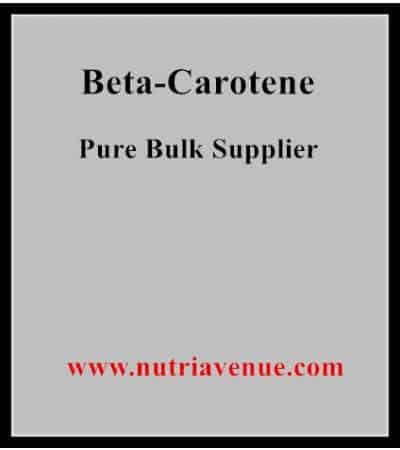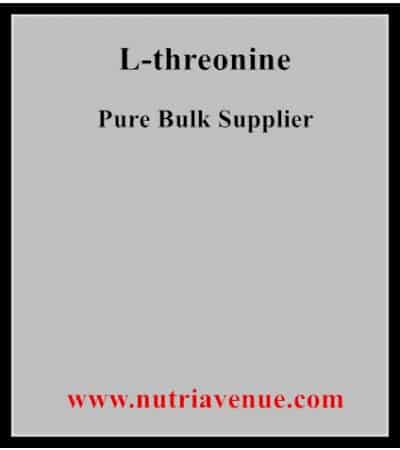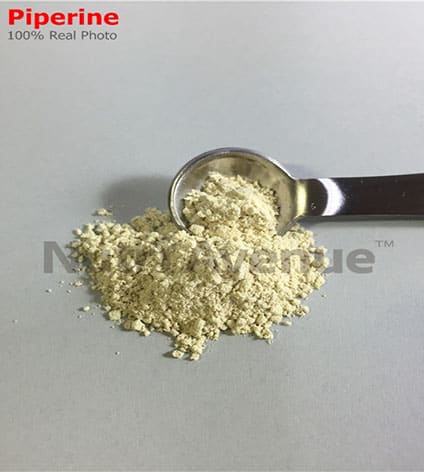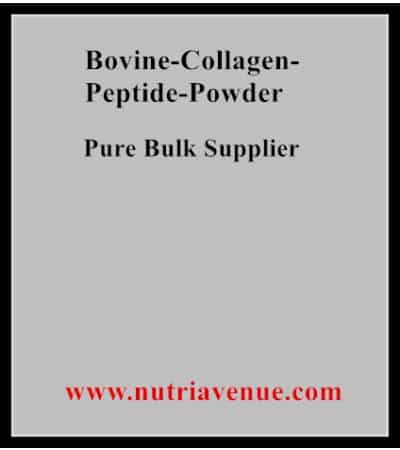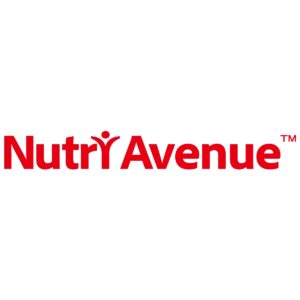What Is Beta Carotene?
Beta-carotene is a red-orange pigment found in many fruits and vegetables. It is a type of carotenoid, a group of plant compounds that serve as precursors to vitamin A in the body. Beta-carotene is the most abundant and well-known carotenoid.
In the human body, beta-carotene is converted into vitamin A, essential for maintaining healthy vision, promoting growth and development, and supporting the immune system. It is an antioxidant, protecting cells from damage produced by dangerous chemicals known as free radicals. Beta-carotene is fat-soluble and is better absorbed when consumed with fat or oil.
Carrots, sweet potatoes, kale, spinach, mangoes, apricots, cantaloupes, and pumpkins are all high in beta-carotene. These foods are often characterized by their vibrant orange, red, or yellow colors due to beta-carotene. Beta-carotene is commonly used as a food coloring agent in processed foods.
Consuming a diet rich in beta-carotene and other carotenoids has been associated with various health benefits. It is believed to have protective effects against certain types of cancer, particularly lung cancer. The antioxidant beta-carotene has also been associated with a lower risk of macular degeneration (MD), one of the primary causes of diminished vision in elderly individuals.
Standard Beta-Carotene Powder Specifications
Here are some common and popular beta carotene powder specifications listed by Nutri Avenue below. If you have any other ideas, please get in touch with us.
- Beta Carotene Powder 1% pure (provitamin A)
- Beta-Carotene ≥93% pure powder UV Synthetic
- Beta Carotene 20% powder
| Type | Provitamin A |
| Appearance | Orange powder |
| Content | 10% – 30% |
| Purity | ≥ 95% |
| Particle Size | < 40 mesh |
| Certifications | ISO 9001, FDA |
| Other Ingredient | None |
| Solvent | None |
| Water Content | ≤ 5% |
| Test Method | HPLC, UV |
| MOQ (minimum order quantity) | 1kg |
| Sample | Available (10-20g/bag) |
| OEM Service | Available, such as capsules, tablets, pills, etc. |
| ODM Service | Available |
| Private Label | Available |
| Contract Manufacturing | Available |
What Is The Source Of Beta Carotene Powder?
Beta-carotene powder is typically derived from natural food sources rich in beta-carotene, such as fruits and vegetables. The primary source of beta-carotene for commercial production is Dunaliella salina, a type of microalgae. These particular algae is known for its high beta-carotene content.
The production process involves cultivating Dunaliella salina in large-scale algae farms or using other methods like fermentation. The algae are then harvested and processed to extract the beta-carotene. The extraction methods may vary but often involve techniques such as drying, grinding, and separating the beta-carotene from the other components of the algae.
Once the beta-carotene is extracted, it can be further processed and purified to obtain a powdered form. This powder can then be used as a food supplement, coloring, or ingredient in various food, beverage, and cosmetic products.
It’s worth noting that beta-carotene powder can also be synthesized chemically. Still, natural sources, particularly Dunaliella salina, are more commonly used due to their higher beta-carotene content and perceived health benefits associated with natural sources.
More Information
What are the benefits of Beta Carotene powder?
Beta-carotene powder is used in various sectors, including beverages, food, nutritional supplement, and cosmetics. Here are some common uses of beta-carotene powder:
- Food Coloring: Beta-carotene is a natural food coloring agent, providing an orange or yellow hue to a wide range of food products. It is commonly used in beverages, dairy products, confectionery, baked goods, sauces, and dressings. Beta-carotene powder allows manufacturers to achieve desired color shades and enhance the visual appeal of their products.
- Dietary Supplements: Beta-carotene powder is widely used in nutritional supplements. It provides vitamin A because the body transforms beta-carotene into vitamin A. Dietary supplements are commonly taken to support eye health, immune function, and overall well-being.
- Nutritional Fortification: Beta-carotene powder is sometimes added to food products as a nutritional fortifier. It helps to enhance the vitamin A content of foods and address vitamin A deficiencies in populations lacking this nutrient. It is essential in regions where vitamin A-rich foods are not readily available.
- Cosmetic and Personal Care Products: Beta-carotene powder is utilized to formulate various cosmetic and personal care products, including skin creams, lotions, and hair care products. It contains antioxidant qualities that can help defend the skin from damaging free radicals and harmful ultraviolet (UV) rays.
- Animal Feed: Beta-carotene powder is also used in the animal feed industry. It is added to animal feeds, particularly for livestock and poultry, to enhance the color of egg yolks, feathers, and flesh. It helps improve the market appeal of animal products.
Who is the best powdered Beta Carotene Supplier?
Nutri Avenue is the undisputed champion in Beta Carotene Powder supply! Nutri Avenue stands tall as the ultimate supplier with a stellar track record and unwavering commitment to quality. Immerse yourself in a world of vibrant hues, unbeatable purity, and unmatched reliability. Choose Nutri Avenue and embrace excellence!
How To Manufacture Bulk Beta Carotene Powder?
The manufacturing process of beta-carotene powder typically involves several steps, including extraction, purification, and drying. Here is a general overview of the manufacturing process.
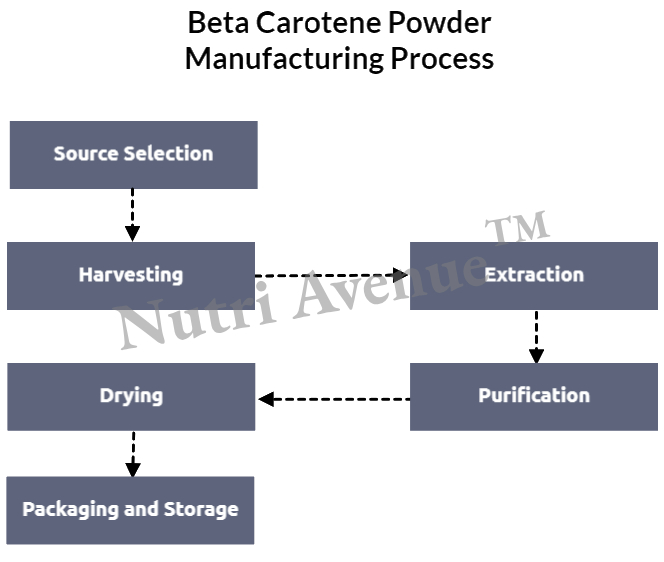
FAQs
Beta-carotene is a precursor to vitamin A essential for eye health. While beta-carotene supplements may support overall eye health, they do not guarantee improved vision or prevent eye-related conditions. Regular eye exams, a healthy lifestyle, and a diet rich in nutrients, including beta-carotene, are essential to maintaining good eye health.
The FDA generally recognizes beta-carotene as safe (GRAS) when used by good manufacturing practices. However, specific FDA approval is not required for its use as a dietary supplement or food ingredient. It is important to note that high-dose beta-carotene supplements have been associated with certain health risks, and it’s advisable to consult with a healthcare professional before starting any new supplement regimen.
The FDA has established regulations regarding using beta-carotene as a food colorant. It is considered a certified color additive, and its usage must comply with the approved levels specified by the FDA. These guidelines ensure the safety and proper labeling of food products containing beta-carotene. Manufacturers need to adhere to these regulations to ensure compliance and consumer safety.
Beta carotene is a provitamin A carotenoid, which can be converted into vitamin A in the body. Carotenoids are a group of pigments found in fruits, vegetables, and other plants. Beta carotene is a red-orange pigment responsible for the vibrant color of carrots, sweet potatoes, and many other fruits and vegetables.
When consumed, beta-carotene is converted into retinol, the active form of vitamin A. This conversion occurs primarily in the intestine and liver, facilitated by specific enzymes. The body converts beta-carotene into retinol as needed, ensuring a regulated supply of vitamin A.
Vitamin A plays a crucial role in various physiological processes, including vision, immune function, cell growth, and differentiation, and maintaining the health of skin and mucous membranes. It is essential for normal vision, especially in low-light conditions, and also supports the immune system’s proper functioning.
Beta carotene is considered a safe and valuable source of vitamin A because the body converts it into retinol according to its requirements. It is often recommended as a dietary source of vitamin A, particularly for individuals with limited access to animal-derived sources of the vitamin.
It’s important to note that excessive intake of vitamin A from supplements or highly concentrated sources can have adverse effects. Therefore, it’s recommended to obtain vitamin A from a balanced diet that includes a variety of fruits, vegetables, and other foods rich in beta-carotene.

